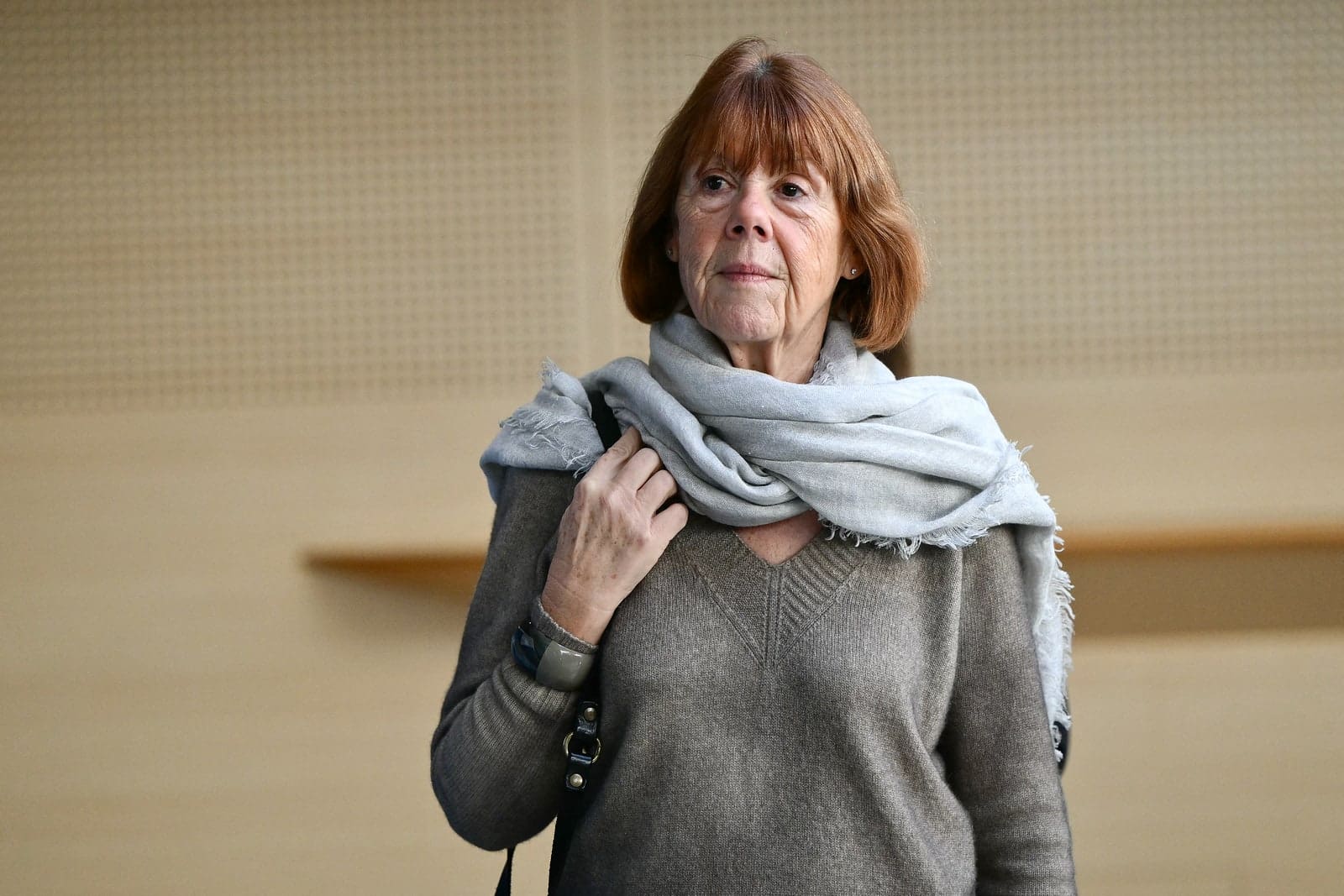Illustration: Cecilia Lundgren
Update: On December 19, 2024, the sentence against Gisèle Pelicot’s husband, the main defendant, was announced. Dominique Pelicot, who had confessed to the crimes in court, was sentenced to a maximum of 20 years in prison for aggravated rape. The verdict is not yet final. According to the dpa News Agency, one of the other defendants was found guilty of attempted rape and two of sexual assault. All the other men were also charged with aggravated rape. Their sentences are also to be announced later today.
This article was first published – together with the digital cover – on the occasion of the International Day for the Elimination of Violence against Women on November 25, 2024.
Serious things have to come together for a person to become a symbol – and this is the case with French woman Gisèle Pelicot. Since the opening of the Mazan trial on September 2, 2024, the whole of France has been in turmoil, and shortly afterwards the whole world was. Mazan is a small wine village in Provence in the south of France, with an ancient walled town and around 6,000 inhabitants; Keira Knightley got married here. In this very Mazan, 51 men are currently on trial, accused of aggravated rape.
At the center of it all: Gisèle Pelicot. Together with her husband Dominique, she worked for a French energy supplier for many years, had three children, a daughter and two sons. In 2013, they moved to Provence, to the scene of the crime behind the Avignon court case.
For more than nine years, Dominique Pelicot regularly drugged his wife Gisèle, according to the accusation, raped her and offered her in an unconscious state to other men on the internet, who raped the unconscious woman, unprotected, and allowed themselves to be filmed by her husband. 50 of them are on trial, the others could not be identified, are deceased or have gone into hiding.
The truth only came to light by chance when Dominique Pelicot was arrested in 2020. He had filmed women up their skirts in the supermarket. Investigators then searched the Pelicots’ apartment and found a folder on his computer hard drive entitled “Abuse”, in which he had collected recordings of the rapes. It is therefore not surprising that Dominique Pelicot fully confessed. “I am a rapist like the others in this room,” he said in court. Most of the 50 co-defendants pleaded not guilty and many stated that they had assumed that the husband’s consent was sufficient. Statements that give a deep insight into their understanding of women’s rights.
Trials for acts of violence of this severity usually take place in camera. On the one hand, to protect the privacy of the accused, and on the other, to offer the victims a protected space. Gisèle Pelicot does without this. She does not want to fight her battle in private, but makes it public, for spectators, for the press, for other women. She turned her ordeal into a historic moment and dedicated her fight to “all women and men around the world who have been victims of sexual violence”.
Her case, which became known as the Avignon trial, has since been covered by the international press. The “New York Times” wrote about the case, the British “Guardian”, the Spanish newspaper “El Mundo” and Indian media also reported on the unprecedented trial in Europe. People all over the world are showing solidarity with Gisèle Pelicot. Her daughter called Dominique Pelicot, her own father, “one of the biggest sex criminals of the last 20 years” in the courtroom.
The perpetrator is in the bedroom
The scale of the case being heard in Avignon is extraordinary. However, the deeds behind it are not. Rape is, it has to be said with such perfidy, an everyday occurrence. In Germany, the number of sexual assaults on women rose by over six percent in 2023 compared to the previous year. There are 94,000 rapes or attempted rapes in France every year. The omnipresence is frightening, as the crime scene makes clear. Mazan is not declared a “problem district” with an above-average crime rate; it is a small village, and yet Dominique Pelicot was able to find so many men who were willing to rape his unconscious wife and allow themselves to be filmed. Gisèle Pelicot’s rapists were men from next door, aged between 21 and 68. They included a journalist, a fireman, a truck driver, a nurse, a prison guard, pensioners, a businessman, married men, including an HIV-positive man who raped her six times. A representative sample of French male society.

This striking average of the dock confirms what we already know: Women are most threatened by the men they know. In most cases, the rapists are social acquaintances or friends, colleagues, their relatives, their own partner or husband. Until 1997, marital rape was not punishable by law in Germany. The current CDU/CSU candidate for chancellor, Friedrich Merz, was among the 138 MPs in the decisive vote at the time who rejected the motion to equate marital rape with rape outside of marriage and thus make it punishable.
And so the case from Avignon, which can hardly be surpassed in terms of deviousness, is able to reflect the everyday reality of women: There are many men who feel they are right to act in this way for a wide variety of reasons.
The issue with the evidence
However, the case is not only unique in its scale, but also in its evidence. Gisèle Pelicot was unconscious when her husband set other men to rape her. The possibility of ambiguous signals did not exist in the first place, making a whole series of the usual procedural questions superfluous: Did you really say no clearly? Did you perhaps send other signals? What underwear did you wear? Gisèle Pelicot, even in the greatest suspicion, cannot be accused of any complicity. Then, of course, there is the meticulous documentation, the hours of footage, labeled and stored in a folder. Dominique Pelicot’s remorseful confession was the only defense strategy left to him.
In most cases, however, things are different. The conviction rate for rape is low, according to several studies. The exact figure is not statistically recorded. However, in March 2016, the then Federal Minister of Justice, Heiko Maas, stated that only eight percent of all reported rapes resulted in a conviction. “Aha!”, some may reflexively exclaim. “Then there must have been a lot of false accusations!” However, this impulse, which has taken on a life of its own since the rise of the me-too movement, can be rejected: The Federal Association of Women’s Counseling Centers and Women’s Emergency Calls estimates the proportion of false accusations in Germany, citing a Europe-wide study, at: three percent.
Time for classification and a visit to Berlin-Neukölln. Here, in a commercial building behind frosted glass walls, sits family lawyer Asha Hedayati. In her book “Silent Violence”, she writes about the structural violence that women experience after they have freed themselves from a violent situation. “Women who have been raped rarely receive justice in our legal system,” says Hedayati. As a lawyer, she is going out on a limb with this statement, but she stands by it.
There are several reasons for this, but one is central – it lies in finding the truth. In most rape cases, there are no witnesses. As a rule, it is testimony against testimony, and the case is dropped for lack of evidence. In favor of the presumption of innocence, an age-old dilemma of legal philosophy. “This can be accommodated, for example with the yes-means-yes rule now being discussed in France,” says Hedayati. According to this rule, both parties must have actively consented for sex to be considered legitimate. “However, this deficit cannot be resolved legally.”
“Shame has to change sides”
For many of those affected, however, it doesn’t even get that far. According to estimates, only 9.5 percent of all rapes and sexual abuse offenses are ever reported. “This is often because those affected are ashamed,” says Asha Hedayati. “Because their most intimate sphere has been invaded.” Indeed, criminological research suggests that shame is a decisive factor in explaining why so few cases are reported. And it is the factor that Gisèle Pelicot fights most aggressively in Avignon. She enters the courtroom upright and with dignity, accompanied by the applause of the people who stand in front of the building every day of the trial.
Gisèle Pelicot is a living symbol of what she herself describes as the “shifting of shame” from the victims of sexualized violence to the perpetrators. “Shame must change sides.” You have to repeat this sentence, gargle it and shake it around in your mouth until you have really internalized it. Even if it is Gisèle Pelicot on whose body these crimes were committed, the abnormality lies in the act, and therefore she is not only free of any guilt, but should also be free of any shame. “The reprehensibility, the shame lies solely with the perpetrator,” says Asha Hedayati. It is the transformative and arguably most meaningful message of the process.
Overcoming shame, as Gisèle Pelicot so courageously does, is difficult but enormously important. What if women on the subway immediately said something when they were “accidentally” touched on the bottom? If we immediately spoke up about assault in a relationship? If everything violent, everything that happened without consent, was immediately denounced? If the perpetrator could never rely on the high probability that the victim would remain silent out of shame anyway?
For all those who know what it feels like when someone disregards their own boundaries, Gisèle Pelicot’s attitude is a rebellion against the world they grew up in. How many of us have been ashamed or repressed out of disgust, not wanting to be responsible for arguments, poisoned workplaces, broken families or broken friendships? “Pelicot’s courage,” says Asha Hedayati, “shows us women that we can resist. And it shows us how many people today are prepared to wait and applaud outside the courtroom, trial day after trial day.”
After Pelicot
There is a before and an after to the Pelicot case. In this after, there are still legal deficits. The problem of establishing the truth in rape trials has not been solved. Nevertheless, Gisèle Pelicot and her trial have triggered a change. Now that she has become a symbol, his client feels “an even greater responsibility to persevere”, said Gisèle Pelicot’s lawyer Stéphane Babonneau. “To show that you don’t have to hide as a victim of a sexual crime. Even if the most intimate and private things become public. Shame must not lead to silence.” Don’t keep quiet. Be loud.
Then Stéphane Babonneau says a sentence that sticks in your mind: “Otherwise the truth will never come to light.” The truth he is talking about is the number of unreported cases. The truth of all those women who have experienced assaults and have said nothing out of fear, resignation and shame. For them, Gisèle Pelicot’s attitude is a beacon. She shows us that the disgusting things were done by the perpetrators, they are despised and shamed for the rest of their lives. For those affected, however, there is an afterlife. One with their heads held high, with dignity and a loud voice.
This article was originally published on Vogue Germany.
- Amanda Nguyen Charts a Path Guided by the Stars
- Raising Hope: Meet Joji Pantoja, The Woman Building Peace With Coffee
- Odd Romance: Mich Dulce’s Intimate Ballet of Form and Flow“Raising Hope” in the spirit of International Women’s Month
- Our Bodies Hold Histories—What One Vogue Editor Learned During an Ancestral Clearing Session
